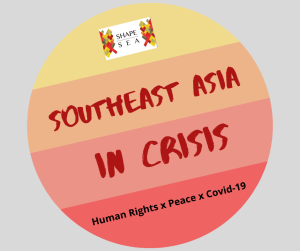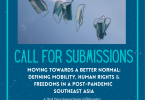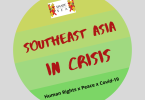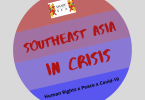Joel Mark Baysa-Barredo Joel is Programme Director of SHAPE-SEA. He would like to thank Patricia Miranda, a health and human rights campaigner based in the Philippines, for additional information and insights.
 The Southeast Asian COVID-19 response contains all the critical elements of securitization. In countries like the Philippines and Cambodia, laws granting emergency powers were passed that gave various heads of state to enforce peace and security measures to address economic recession. What started with lockdowns, travel bans, border closures eventually led to police surveillance, detainment, control of access to information, and further shrinking of spaces for dissent and activism (Chen, 2020.)
The Southeast Asian COVID-19 response contains all the critical elements of securitization. In countries like the Philippines and Cambodia, laws granting emergency powers were passed that gave various heads of state to enforce peace and security measures to address economic recession. What started with lockdowns, travel bans, border closures eventually led to police surveillance, detainment, control of access to information, and further shrinking of spaces for dissent and activism (Chen, 2020.)
However, lived experiences in the region show that the securitization of Covid-19 comes with a painful cost. There is clear evidence that disruptions of public health and other essential services, coupled with highly-securitized emergency measures, can create more dangers, especially in contexts where there are insufficient social safety nets and legal safeguards (Miranda and Angkaya, 2020). As such, the pandemic is perceived as a threat to the people, requiring stringent, repressive measures to combat it (Nunez, 2020.) Furthermore, by adopting this wartime rhetoric, States deem necessary to suspend fundamental rights and freedoms to achieve victory (Carbonaro, 2020.) To make matters worse, people are obliged to assume duties and responsibilities sanctioned by the state; and anyone who disobeys and divert from the agenda would pay a hefty price.Danger at the front linesFrontline workers throughout the region are enduring the brunt of the lack of strategic and generous support from their governments. Repeated calls for adequate provision of personal protective equipment and increased case testing have fallen on deaf ears (Salsabila, 2020). Unscientific responses by public officials misguided the public, leading to the ballooning of infections and deaths (Hasanah, 2020) Furthermore, social stigma and acts of violence have impeded health workers, as well as, survivors from enjoying a safe and decent life (Kurniawan, 2020 and Catolico, 2020.) Front liners based in conflict-affected areas have reported that militarized and draconian measures harm communities, since it creates a culture of fear and silence (Abo and Ayao, 2020).In pursuit of beating Covid-19, all Southeast Asian States resorted to a militarized approach. Since the onset of the Covid-19 outbreak, activists and development workers have been playing a pivotal role in responding to the needs of communities, calling out corrupt and abusive policies and practices, and pushing for health-centered approaches to the crisis (Adorador, 2020.) However, governments seem to view these actions as threats to the agenda of national peace and security. Emergency laws and policies have been used to silence and purge human rights defenders. The State of Emergency Law in Cambodia had provided authorities powers to place restrictions on the use of social media or the freedom of telecommunications, as well as to surveil on suspected dissidents (Pinol, 2020.) In the Philippines, Human rights defenders involved in food distribution in Bulacan Province were charged with violating the Bayanihan to Heal As One Act and incitement to commit sedition after finding newspapers and magazines with anti-government content in their vehicle. The same law was also used as a basis for government officials to order for the arrest of those they deem to be spreading fake news on Social media (Conde,2020.) In Indonesia, police regulations served as the basis for the arbitrary arrests of individuals and groups who were allegedly disrupting public order (Rumpia, 2020.) Even in Timor Leste, freedom of expression and press freedom has been curtailed in light of the national state of emergency (Alves, 2020.)The precarity of informality Dire economic conditions, social exclusion, and repressive policies make up a perfect storm ravaging the deprived, disenfranchised and underserved amid Covid-19. Poverty has been the biggest hindrance for many governments in enforcing measures. Social distancing is just impossible for the poor who live in cramped spaces and rely on mass transportation to earn a living (Abuso, 2020.) Access to cash aid and essential health services have become arduous for those living on survival. This has been the case in Timor Leste, where affected rural and urban poor communities were left hanging on a promised meager subsidy (Da Fonseca, 2020.) In Thailand, informal workers have suffered the most due to the inability to access health insurance and difficulties in accessing government aid (Cassinerio, 2020.) Furthermore, communities are excluded from engaging in strategic measures to curb the contagion (Ampilan, 2020.) This is the main reason why they remain significantly at risk of new infections.This pandemic has exposed gaps in the scope of the right to public health amid the state of emergency. Migrant workers, refugees, stateless people are left to fend for their survival, forcing them into desperation and invisibility in their host countries. They have been struck than any other vulnerable groups mainly because they are voiceless, estranged, and most are undocumented, making them most at risk in times of national crisis (Ramachandran, 2020.) Refugees in Malaysia and Thailand are forced to break social distancing and quarantine rules to be able to access government support or to creatively seek channels for survival (Jalil, 2020 and Jittiang, 2020.) A critical mass of Filipino migrant workers in the Mekong Region, on top of the inability to access cash aid, have to endure no work, no pay policies imposed by their employers (Novio, 2020.) In Singapore, before the discovery of a high number of cases of COVID-19 among migrant workers, government distribution of face masks and hand sanitizer, apart from was limited only to citizens. The crisis has indeed has brought up issues of ˜hidden apartheid ™ not only on the grounds of race but also of citizenship (Petcharamesree, 2020).Gender at the core of response actionsThe struggle for gender equality and justice cuts across generations and sectors, reaffirming the need for powerful collective action in responding to today ™s challenges, including the specter of COVID-19. A gender perspective is also needed to ensure response operations and strategies do not reinforce discrimination, or enable impunity and violence to thrive. Instead, a peaceful and inclusive COVID-19 response should respond adequately to the different needs of women and girls, homeless and displaced, indigenous peoples, persons with disabilities, and other vulnerable sectors (Abo and Ayao, 2020).While the virus does not discriminate, women and the Lesbian, Gay, Bisexual, Transgender, Intersex, and Queer (LGBTIQ) communities have much suffered from disproportionate impacts of the Covid-19 crisis. From a gender lens, securitization aggravates inequalities amongst women and sexual communities. They enjoy limited access to health care or any form of social protection to shield them from the pandemic (Aranas, 2020.) Furthermore, women are compelled to fend for their families ™ daily needs amid the crisis. In developing countries like Timor Leste, Covid-19 had paralyzed them women, who make up 60% of the informal working sector, from decently making a living due to the shutting down of businesses (Chen, 2020.)Women across Southeast Asia are forced by gendered expectations to assume unpaid care work for their families, especially the sick or for the quarantined in the absence of enough hospital beds and access to critical medical and social services (Aranas, 2020.) There has also been a rise in domestic violence during national lockdowns. In Malaysia, women and girls who experienced abuse cannot escape the house, and they are likely to be trapped with the abusers. Thus, movement restrictions make it harder for the victims to report the case and seek help on time (Try, 2020.)Even before the pandemic, members of the LGBTIQ communities have already been facing discrimination and violence stemming from conservative patriarchal, religious, as well as hetero- and cis-normative values imposed by society in the region. This condition had pushed them to the fringes of society. Restrictions and repressive measures on Covid-19 left many scrambling for survival. A significant population of LGBTIQ individuals, who have to rely on the informal sector and gig economy, suddenly find themselves out of work. In terms of personal safety and security, there have been cases of domestic violence (physical and mental) against individuals living in unaccepting and abusive households during the self-quarantine/lockdown period (Hanung, 2020.)Violence against LGBTIQ persons is also rampant in the public domain ”ranging from humiliation to deception and death. In the Philippines, three young LGBTIQ persons were questioned for violating the curfew. A village official accused them of looking for illicit sex and, as punishment, publicly humiliated them by ordering them to kiss, dance, and do push-ups on a live video broadcast on social media. They were identified by name, and the videos of their punishment went viral, adding to their embarrassment. (Thoreson, 2020) In Indonesia, YouTuber Ferdian Paleka, delivered care packages full of garbage to transwomen in Bandung, West Java. In North Jakarta, a transwoman who was burned to death by a mob in public. Both garnered lukewarm reaction from people and officials, proving that stigma and discrimination against LGBTIQ in much is greatly normalized (Saputra, 2020.)Breaking the silenceThe securitization of Covid-19 in Southeast Asia has, indeed, done more harm than benefits to the hundreds of millions living at the edge of fear and uncertainty. At this point, we still can ™t tell when the dust will fully settle. While the world waits for a vaccine that will end our fear, it is critical to ensure that systems and structures are reformed to accommodate the demands of a Post-Covid world adequately. In pursuit of rights-centered governance, plans and policies should respond appropriately to the different needs of women and girls, LGBTIQ persons, workers, refugees, migrants, asylum seekers, indigenous peoples, persons with disabilities, and other groups who are most marginalized and excluded.Everyone has a role to play in mitigating the worst of the impacts of this public health emergency. People and their rights must be placed front and center in the COVID-19 response and recovery. We must break the silence when it comes to the stigma and discrimination. At the core of any action, government response actions should never dismiss or ignore the importance of human lives, livelihoods, and rights. This is why we urgently need pro-poor and gender-embracing approaches to hurdle this health, poverty, and inequality crisis. We need more significant and meaningful participation from marginalized and vulnerable sectors in both community and high-level decision-making levels to address any type of compounded crises that come our way.References:Abo, Noraida and Abie Ayao (2020), The Compounded Threat of COVID-19 and Armed Conflict in Mindanao in SHAPE-SEA ™s Southeast Asia in Crisis. Available at https://shapesea.com/op-ed/covid-19/the-compounded-threat-of-covid-19-and-armed-conflict-in-mindanao/ <Insert citation for Abo and Ayao SHAPE SEA op-ed> (access 13 June 2020)Abuso, Ma. Gretchen (2020). Understanding the Social Dimension of Receiving Aid in SHAPE-SEA ™s Southeast Asia in Crisis. Available at https://shapesea.com/op-ed/covid-19/understanding-the-social-dimension-of-receiving-aid/ (accessed 8 June 2020)Adorador, Sensei (2020). Defending Human Rights in the Time of Covid-19: Collective Action Against State Repression in the Philippines in SHAPE-SEA ™s Southeast Asia In Crisis https://shapesea.com/op-ed/covid-19/defending-human-rights-in-the-time-of-covid-19-collective-action-against-state-repression-in-the-philippines/ (accessed 7 June 2020)Alves, Joanico (2020). Interrogating the Level of Freedom of Expression and Access to Information in Timor-Leste in the Time of Covid-19 in SHAPE-SEA ™s Southeast Asia In Crisis. Available at https://shapesea.com/op-ed/covid-19/interrogating-the-level-of-freedom-of-expression-and-access-to-information-in-timor-leste-in-the-time-of-covid-19/ (accessed on 8 June 2020)Ampilan, Duoi (2020). Communities at the Frontlines of Beating COVID-19 in SHAPE-SEA ™s Southeast Asia in Crisis. Available at http://shapesea.com/op-ed/covid-19/communities-at-the-frontlines-of-beating-covid-19/ (accessed on 8 June 2020)Aranas, Mark Vincent (2020). Reducing weight on women ™s shoulders in SHAPE-SEA ™s Southeast Asia in Crisis. Available at https://shapesea.com/op-ed/covid-19/reducing-the-weight-on-womens-shoulders/ (accessed 8 June 2020)Carbonaro, Giulia (2020). Can We Compare the Covid-19 Pandemic to a World War? in CGTN. Available at https://newseu.cgtn.com/news/2020-05-08/Can-we-compare-the-COVID-19-pandemic-to-a-world-war–Qhw25Ig9Fe/index.html (accessed on 7 June 2020).Cassinerio, Joana (2020). Land of Smiles?: A brief assessment of the effects of Covid-19 on the life of a motorbike taxi driver in Salaya, Nakhon Pathom, Thailand in SHAPE-SEA ™s Southeast Asia in Crisis. Available at https://shapesea.com/op-ed/land-of-smiles-a-from-formal-into-informal-labour-thailand/ (accessed on 8 June 2020.)Catolico, Gianna (2020). Discrimination and social stigma perturbing front liners and COVID-19 patients in the Philippines in SHAPE-SEA ™s Southeast Asia in Crisis. Available at http://shapesea.com/op-ed/covid-19/discrimination-and-social-stigma-perturbing-frontliners-and-covid-19-patients-in-the-philippines/ (accessed on 8 June 2020)Chen, Li-li (2020). Securitization of COVID-19 In Timor-Leste: A Gender Perspective in SHAPE-SEA ™s Southeast Asia in Crisis. Available at http://shapesea.com/op-ed/covid-19/securitization-of-covid-19-in-timor-leste-a-gender-perspective/ (accessed on 8 June 2020)Chen, Li-li (2020). Human Rights and Democracy Amidst Militarized COVID-19 Responses in Southeast Asia in E-International Relations. Available at https://www.e-ir.info/2020/05/13/human-rights-and-democracy-amidst-militarized-covid-19-responses-in-southeast-asia/ (accessed on 7 June 2020).Conde, Carlos (2020). Philippine Activists Charged with Sedition, ˜Fake News ™: Government Misusing Covid-19 Law Against its Critics in Human Rights Watch. Available at https://www.hrw.org/news/2020/04/22/philippine-activists-charged-sedition-fake-news (accessed 8 June 2020)Da Fonseca, Celso (2020). The Curious Case of Subsided Subsidies: Failed Political Promises in the midst of COVID-19 in Timor-Leste in SHAPE-SEA ™s Southeast Asia in Crisis. Available at https://shapesea.com/op-ed/covid-19/the-curious-case-of-subsided-subsidies-failed-political-promises-in-the-midst-of-covid-19-in-timor-leste/ (accessed on 8 June 2020)Fauziah, Puji (2020). Amnesty Internasional Indonesia: Penganiayaan Ferdian Paleka Selama di Tahanan Melanggar HAM in depok.com. Available at https://depok.pikiran-rakyat.com/nasional/pr-09382328/amnesty-internasional-indonesia-penganiayaan-ferdian-paleka-selama-di-tahanan-melanggar-ham (accessed on 9 June 2020)Hanung, Cornelius (2020). How COVID-19 might disproportionately affect the LGBTIQ community in ASEAN in SHAPE-SEA ™s Southeast Asia in Crisis. Available at http://shapesea.com/op-ed/covid-19/how-covid-19-might-disproportionately-affect-the-lgbtiq-community-in-asean/ (accessed on 8 June 2020)Hasanah, Mahesti (2020). Unscientific Approach by Indonesian Government Violates Right to Information in SHAPE-SEA ™s Southeast Asia In Crisis. Available at http://shapesea.com/op-ed/covid-19/unscientific-approach-by-indonesian-government-violates-right-to-information/ (accessed on 8 June 2020)Jalil, Aslam Abd (2020). Covid-19 pandemic: Refugee and State Responses in Malaysia in SHAPE-SEA ™s Southeast Asia in Crisis. Available at http://shapesea.com/op-ed/covid-19/covid-19-pandemic-refugee-and-state-responses-in-malaysia/ (accessed on 8 June 2020)Jittiang, Bhanubatra (2020). Is the Light Getting Dimmer for Urban Refugees in Thailand in the Time of Covid-19? in SHAPE-SEA ™s Southeast Asia in Crisis. Available at https://shapesea.com/op-ed/covid-19/is-the-light-getting-dimmer-for-urban-refugees-in-thailand-in-the-time-of-covid-19/ (accessed on 8 June 2020)Kurniawan, Muhammad Diaz (2020). A Growing Stigma: The Danger of Discriminating Against the Rights of Healthcare Workers In SHAPE-SEA ™s Southeast Asia In Crisis. Availabe at https://shapesea.com/op-ed/covid-19/a-growing-stigma-the-danger-of-discriminating-against-the-rights-of-healthcare-workers/ (accessed on 8 June 2020)Miranda, Patricia and Salma Angkaya, Legal preparedness during ‘business unusual (Opinion Editorial) in Philippine Daily Inquirer (May 2020).Novio, Eunice Barbara (2020). Where do we Go from Here? An Unsettling Battle for Filipino Migrants in Cambodia and Vietnam amid Covid-19 in Southeast Asia in Crisis. Available at https://shapesea.com/op-ed/covid-19/where-do-we-go-from-here-an-unsettling-battle-for-filipino-migrants-in-cambodia-and-vietnam-amid-covid-19/ (accessed on 8 June 2020).Nunes, Joao (2020). The COVID-19 pandemic: securitization, neoliberal crisis, and global vulnerabilization in Cuadernos de Saude Publica Vol. 9 No. 5. Available athttps://www.scielo.br/scielo.php?pid=S0102-311X2020000500501&script=sci_arttext&tlng=en (accessed on 7 June 2020).Petcharamesree, Sriprapha (2020). Covid-19 in Southeast Asia: non-citizens have a right to protection too in Open Democracy ™s Pandemic Borders. Available at https://www.opendemocracy.net/en/pandemic-border/covid-19-southeast-asia-non-citizens-have-right-protection-too/ (accessed on 8 June 2020).Pinol, Marc (2020). COVID-19 in Cambodia: Leadership or Autocracy? in SHAPE-SEA ™s Southeast Asia in Crisis. Available at https://shapesea.com/op-ed/covid-19/covid-19-in-cambodia-leadership-or-autocracy/ (accessed on 8 June 2020).Ramachandran, Ruthra Mary (2020). Ensuring Food Security for Invisible Communities during the Covid-19 pandemic in SHAPE-SEA ™s Southeast Asia in Crisis. Available at https://shapesea.com/op-ed/covid-19/ensuring-food-security-for-invisible-communities-during-the-covid-19-pandemic/ (accessed on 8 June 2020).Ramadani, Saputra (2020). Recent cases of persecution set back LGBT rights advocacy in Jakarta Post. Available athttps://www.thejakartapost.com/news/2020/05/27/recent-cases-of-persecution-set-back-lgbt-rights-advocacy.html (accessed on 9 June 2020)Rumpia, James Reinaldo (2020). At the Brink of National Terror: Repressive State Apparatus in Indonesia ™s Covid-19 Situation in SHAPE-SEA ™s Southeast Asia In Crisis. Available at https://shapesea.com/op-ed/covid-19/at-the-brink-of-national-terror-repressive-state-apparatus-in-indonesias-covid-19-situation/ (accessed on 8 June 2020)Salsabila, Sarah (2020). The Portrait of an Indonesian Health Frontliner: Strong Spirit, Vulnerable Body in SHAPE-SEA ™s Southeast Asia In Crisis. Available at http://shapesea.com/op-ed/covid-19/the-portrait-of-an-indonesian-health-frontliner-strong-spirit-vulnerable-body/ (accessed on 8 June 2020)Sears, Nathan Alexander (2020). The Securitization of Covid-19: Three Political Dillemas in Global Policy. Available at https://www.globalpolicyjournal.com/blog/25/03/2020/securitization-covid-19-three-political-dilemmas (accessed on 7 June 2020).Thoreson, Ryan (2020). Philippines uses Humiliation as COVID curfew punishment in Human Rights Watch. Available at https://www.hrw.org/news/2020/04/08/philippines-uses-humiliation-covid-curfew-punishment (accessed on 9 June 2020)Try, Sophea (2020). Flip Side of the Lockdown in Malaysia: Home May Not be Safe for Women and Girls in SHAPE-SEA ™s Southeast Asia in Crisis. Available at https://shapesea.com/op-ed/covid-19/flip-side-of-the-lockdown-in-malaysia-home-may-not-be-safe-for-women-and-girls/ (accessed on 9 June 2020)





